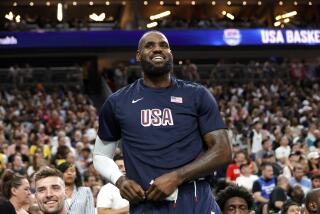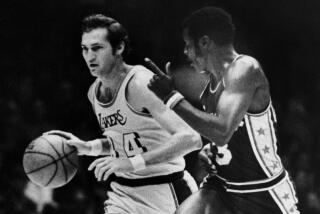Column: Dwyane Wade, from the pleasure through the pain, was able to have his last dance
- Share via
The feeling it all began with was joy.
Dwyane Wade’s love of basketball started when he made a runner somewhere in Blue Island, Ill., a suburb just south of Chicago, one town away from where he grew up in Robbins.
“I threw up the luckiest shot,” the future Hall of Famer told the Los Angeles Times, “and I couldn’t believe it went in.”
They were his first points in organized basketball, playing for a team with a coach in a game officiated by referees. Wade, about 9 years old, scored six points that day. And he was hooked.
The feeling that almost ended all of it was pain — complete and total pain during his prime with the Miami Heat.
Mornings were nearly unbearable. His knees ached so badly he could barely bend them. Tasks that should be simple, such as putting on his underwear, felt more like climbing Mt. Everest.
Sign up for our daily sports newsletter »
Games, when he could get on the court, were just as tough. By the time he got to the locker room afterward, both knees would balloon.
That he was playing on the best team in the world, that he had two of the best teammates of all time in LeBron James and Chris Bosh, that he was winning titles — all of it was dwarfed by the pain.
“It was playing with him more mentally than physically. And physically? He was hurting,” James said. “You can just imagine what it was doing to his brain.”
The hurt was too much. The joy was gone. He wanted out. He thought about retiring.
“My knees were in so much pain,” Wade said. “In my right knee, I had two sets of different bone bruises. I also had chondromalacia under the kneecap, which irritates the kneecap to the extent where it’s just more pain. In my left knee, I had three surgeries so I’m dealing with arthritis. I’m dealing with swelling and all the stuff that comes with that.
“It was a time where I didn’t want to do it anymore. I didn’t want to be in pain anymore.”
Wade will retire after this season, ending a 16-year career with three NBA titles, 13 All-Star appearances and eight All-NBA honors. He won’t walk away limping. He’ll do it healthy, productive and sure of his impact on the game.
For Wade, the feelings he will leave with are gratitude and contentment.
“To have the career I’ve had, my whole role here, when you go back to Robbins, Ill., you wouldn’t have seen this,” Wade said. “You wouldn’t have seen this kind of career. No one could have seen it.”
There were moments along the way that mattered, that kept Wade from being overwhelmed by the poverty that plagued his hometown.
His older stepbrother, Demetrius McDaniel, was a star at Richards High in Oak Lawn, Ill. Wade would tag along to the summer workouts McDaniel would go through on his way to becoming one of the top players in the state.
“Summer before junior year is when I started thinking, ‘This is something I want to do for real for real,’<TH>” Wade said. “When I was a kid, I had a dream because I watched the Bulls win. But watching my older brother, who is two years older than me, watching him have success in high school and then go on to college... To be from the neighborhood, that was like, ‘OK. It can happen. You can get out of here and basketball can be the reason.’”
By the time it was his turn to join the varsity team, the same assistant coach, Gary Adams, who worked out McDaniel asked Wade one of the most important questions of his life.
“Gary came to me and asked me was I ready,” Wade said.
He answered yes — and that meant early morning visits from the coach and trips to the gym for hours and hours of work. It was there that his game started to blossom.
“He had to have seen something. I guess he saw some potential in me,” Wade said. “But he saw a love of the game and some talent in me and he wanted to help me bring it out.”
Wade became a star the following summer after a good season at Richards, a school he had to take a 45-minute bus ride to every morning. He was even better as a senior. But with the question of whether he’d be able to qualify academically for college, his options were limited.
Marquette eventually won out, beating Illinois State for Wade’s commitment. After sitting out one season to become academically eligible, Wade became one of the top players in the country, leading Marquette to the Final Four as a junior before heading to the NBA.
Scouts around the league still tell stories about Wade’s pre-draft workouts, including one in which he vowed to destroy the player he was working out against — while sharing a ride from the airport with that very player.
Once he got to Miami, he was an instant success, winning over admirers with his reckless drives to the basket.
“I don’t think I can think of another star player who went to the ground as much as he did,” Clippers forward Luc Mbah a Moute said.
By Wade’s third season, he was a champion and a Finals most valuable player, but by the time James and Bosh joined him in Miami, all those hits and crashes to the court started to add up.
In the Big Three’s four seasons together, Wade played more than 70 games just once. In their final two years together, he missed almost one out of every four regular-season games.
“It was frustrating for him. He couldn’t play back-to-back games or play consistently because every time he would play, his knees would swell up,” James said. “He’d talk about, ‘I don’t know, man. I don’t know if I can continue to do this. I don’t think I can do it.’ I couldn’t say anything other than, ‘Let’s get through this season. Make the most of it.’
“But he said, ‘I can’t be the player I want to be and help you the way I want to because I can’t even consistently be on the floor with you.’”
Still, they made four trips to the Finals and won two titles before James returned to Cleveland. Wade, his knees still aching, allowed his contract in Miami to expire, opening the door for a short-lived homecoming in Chicago. He reunited with James briefly in Cleveland before being traded back to the Heat.
Before this season, Wade announced it would be his “one last dance.” He was named an All-Star by commissioner Adam Silver, and the February weekend in Charlotte, in a lot of ways, was a celebration of his career.
The weekend kicked off with a dinner in his honor with former greats such as Magic Johnson, Isiah Thomas, Charles Barkley, Tim Hardaway and Grant Hill attending along with some of Wade’s best friends in the NBA — Carmelo Anthony and Chris Paul.
“We’re all going to miss you. But who do I always tell you is going to miss you the most? The Heat,” Paul said at the dinner. “I don’t think about Miami without thinking of [Dwyane Wade].”
Wade called the dinner surreal.
“You’re there, but it’s like an out-of-body experience,” he said. “These are players and coaches, a room full of them — people you’ve looked up to. And sometimes, you don’t get to hear what people have to say about you in a private setting. It was so cool, man.
“I didn’t know I needed that before I end this, but I needed that weekend before I walked away from the game. It let me know how much, how appreciated I am for what I’ve done on and off the court in my career from people I needed to hear it from.”
As the Heat play their final games this season, as they push for a playoff spot to extend Wade’s career if only for one more playoff series, the NBA is celebrating one of its best players — someone on the Mt. Rushmore of shooting guards.
Wade’s been healthy enough to enjoy the celebration, to leave on his terms and not because of frayed ligaments or damaged cartilage.
“You never know how it’s going to end for you,” Wade said during All-Star weekend. “For me to be able to decide that this is my last season and for the fans, the ovations I get in every arena, for the love I get every time we pull up to a hotel, for the things that teams do in the arena for me, it’s just been great. So I’m appreciative.”
And with the season a month away from ending, he’s looking back.
One of his first major commercials, for Converse, showed him in Miami’s empty arena. He marched up the steps to a desk high above the floor. He flipped on a microphone and closed his eyes. And when he spoke, he announced himself to the world.
“From Robbins, Ill., a 6-foot-4 guard, Dwyane Waaaaaaaaddddde.”
Those first points, those bus rides across Chicago’s South Suburbs, the rundown houses — it’s a part of Wade’s story. It always has been.
If he had quit five years ago, a victim of injuries, he wouldn’t have been able to think about all of that. But with Wade dictating the steps to his last dance, he’s let his mind drift back while he’s tried to soak in as much as possible.
“You definitely start thinking about the journey and the beginning and how it all started,” he said.
And a runner, a lucky shot, the exhilaration of that first made basket — it led to all of this.
Staff writer Tania Ganguli contributed to this article.
Twitter: @DanWoikeSports
More to Read
Go beyond the scoreboard
Get the latest on L.A.'s teams in the daily Sports Report newsletter.
You may occasionally receive promotional content from the Los Angeles Times.











